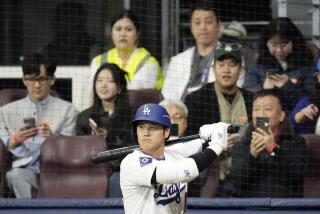Japan, South Korea fortify ties amid economic crisis, but history interferes
- Share via
SEOUL — Japanese Prime Minister Taro Aso’s visit here this week was all about the future: mostly about how to boost cooperation between the Asian neighbors to overcome the global economic crisis.
But for many South Koreans, Aso’s presence was a troubling reminder of a painful past -- not only Japan’s history of colonial brutality but also the forced labor of thousands of Koreans by the Aso family’s mining company during World War II.
The legacy of Koreans, Chinese and other Asians being used as Japanese slave labor generations ago still clouds Tokyo’s attempts at normal diplomatic relations with its neighbors.
And although South Korean President Lee Myung-bak’s administration appears willing to overlook past tensions -- holding talks that included the idea of disabling North Korea’s nuclear arsenal, possibly signing a free trade deal and other economic pacts -- others here weren’t so accommodating.
Aso’s visit drew protesters who decried Japan’s claim to the disputed rocky islets known as Dokdo in South Korea and Takeshima in Japan as well as what they called Tokyo’s brutal colonization of the Korean peninsula between 1910 and 1945.
“Before any economic cooperation, territorial and historical issues should go to the top of any diplomatic agenda,” said Jae-ik Choi, chairman of the Dokdo Island Guardian Nationwide Alliance.
Since taking office 11 months ago, Lee has said he would not demand any new apology from Japan for its colonial rule and has pushed for improved ties with Tokyo.
Choi said Lee’s approach “does not make sense -- it does not seem right.”
“As German leaders shed their tears when they visit Poland, Japan needs to do the same thing,” Choi said. “Aso does not have any right to step on Korean soil until he has said he is sorry for Japan’s past.”
South Korea, a major industrial power in Asia, has been hit hard by the global financial crisis.
Many analysts predict continued gloom in 2009, when the economy is expected to contract as much as 3%.
Japan, one of the world’s largest economies, slid into recession last year and faces massive layoffs and rising unemployment, marking the biggest economic decline in decades.
South Korea and Japan are key trade partners, with two-way commerce reaching $82.6 billion in 2007. But critics accuse Lee’s administration of sacrificing South Korean national pride for short-term economic gains.
Analysts say both Asian leaders are eager to move forward.
“Both sides need economic coordination now,” said Sung-deuk Hahm, a political economy professor at Korea University. “Lee is pragmatic, so is Aso. They did not want to deal with historical matters that can inflame public sentiment. That’s why they focused on the economy.”
But Lee faces critics in his government.
“South Korea has a lot of unsolved issues with Japan,” said Jung-hee Lee, a member of the South Korean National Assembly. “The president has done nothing to satisfy people’s sense of justice.
“Even in an economic crisis, the past cannot be ignored.”
--
--
Ju-min Park of The Times’ Seoul Bureau contributed to this report.
More to Read
Sign up for Essential California
The most important California stories and recommendations in your inbox every morning.
You may occasionally receive promotional content from the Los Angeles Times.














